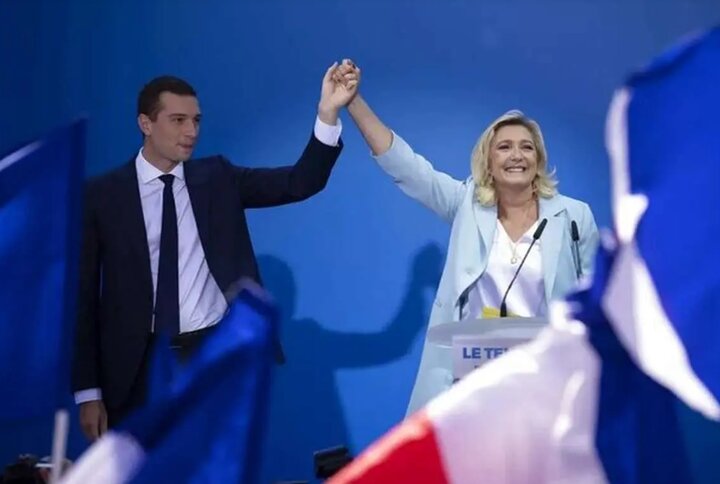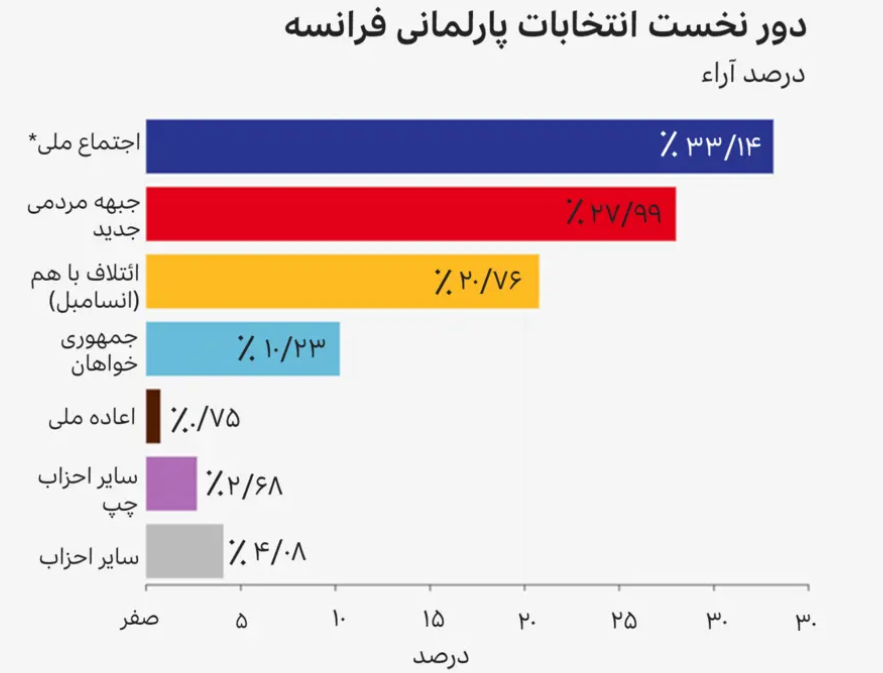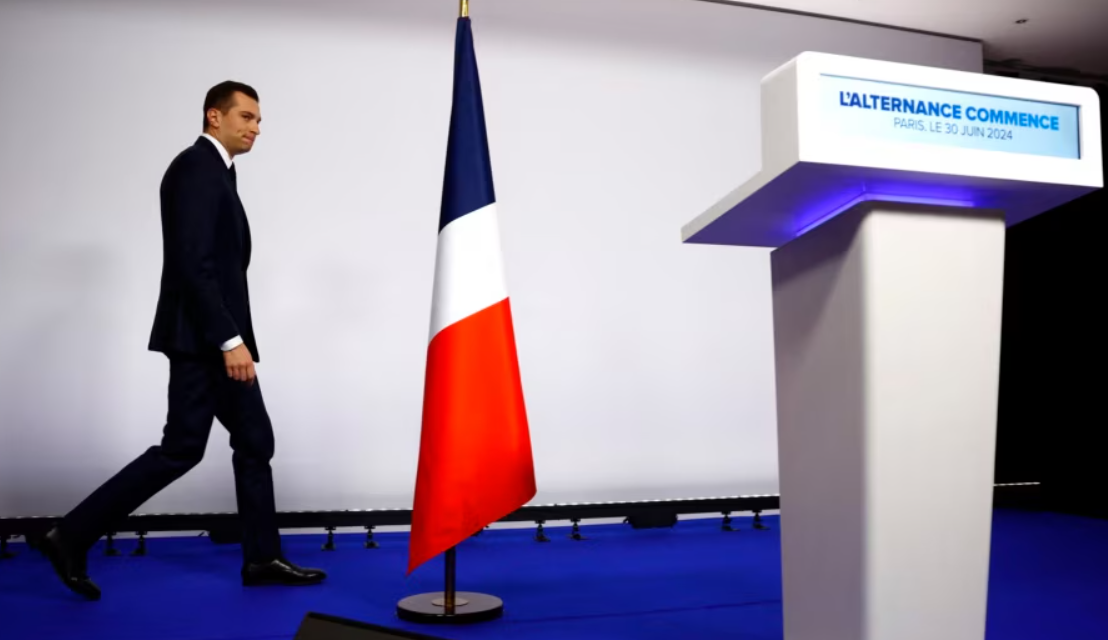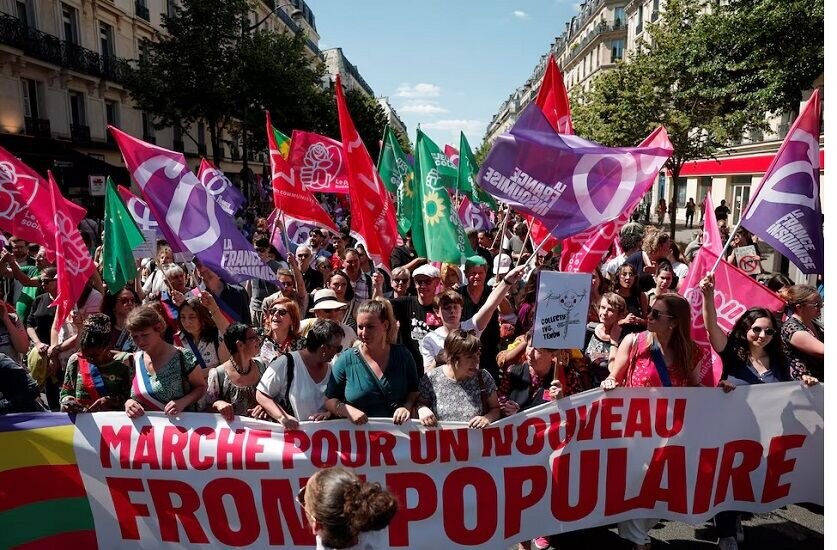Macron’s “big gamble” and the rise of the extreme right in the French elections

Mehr News, International Group: French voters on Sunday, June 30 (July 10) with the presence Unprecedentedly, they participated in early French parliamentary elections. What attracted the most attention was the high participation of about 67 percent of the French in this round of parliamentary elections, which is unprecedented in this country in the past decades and even after the Second World War.
In this election, three big political blocs competed, which included the “National Community” affiliated with the extreme right movement, the moderate coalition “Etafal Baham” led by “Emmanuel Macron” the president of France and the “New Popular Front” coalition consisting of left, center left and green forces.
The results of counting votes in the first stage showed that the right-wing party “National Community” belonging to “Marine Le Pen” won about 33.2% of the votes in the first stage. brought and became the leader of the French parliamentary elections; The votes are about five percent more than the left-wing coalition “New People’s Front” which won 28.1 percent of the votes. Emmanuel Macron’s centrist coalition was also ranked third with about 21% of votes.
With this result, political activists believe that the radical National Assembly party will win 240 to 270 seats out of 577 seats in the French Parliament; The New Popular Front will have 180 to 200 seats and Macron’s centrist coalition will have 60 to 90 seats in the parliament.
This parliamentary election in France will be held in two stages, and the assignment of most of the seats will not be known until the second round of voting on Sunday next week (July 7/July 17). became. Only the candidates who win more than 12.5 percent of the votes advance to the next round.
In the meantime, at the same time as Le Pen asked the people to participate in the second round and determine the assignment of the remaining seats, other parties have also started working as an example of 218 representative candidates. In the French Parliament, democratic and left-wing parties have withdrawn from participating in the second round of the French parliamentary elections in favor of other candidates of their same party who had won more votes in the first round of these elections.
These representatives aimed to use all imaginable strategies to defeat the candidates of the extreme right party led by Le Pen, perhaps by removing themselves from the cycle. Electoral competitions will cause their votes to be cast into the basket of candidates of their own party.
These parties’ fear of the right-wing National Assembly party increased about three weeks ago when it won the European Parliament elections. In the European Parliament, this party was ahead of Macron’s centrist coalition by almost twice as many votes, and therefore the French president dissolved the parliament in an unexpected decision, despite three years of his government remaining.
This act of Macron stunned public opinion and even provoked anger among his faction. He defended it as a “moment of clarity” for citizens to decide who they want to run the country. Of course, in a letter to the French that was published a week ago, he said that whoever wins, he will not resign from the presidency and will remain in this position until the end of his presidential term in 2027.
However, if an opposition party such as National Assembly wins a majority in parliament, Macron will have no choice but to give them the chance to lead and choose the prime minister. to give He should then run the country alongside them; A scenario known as “symbiosis” in French politics. According to observers, “Jordan Bardela”, the 28-year-old leader of the far-right party of France, has a high chance of becoming the prime minister of France.
Why the French tend to the extreme right
Part of the “yes” vote of the French people in the first round of the parliamentary elections to the extreme right is rooted in the divergence of the opposition parties. In the past, the country’s center-right and center-left parties had united to prevent the far-right “National Community” party from gaining power, but this dynamic, which is called the “Republican Front” in France, is less visible today than ever. /p>
One of the other reasons for the French turning away from the ruling spectrum and tending to the extreme right is the issue of reduced purchasing power. This issue was raised before the outbreak of corona with the rise of the so-called “yellow vests” and with the consequences The economic crisis of the corona epidemic and also the war in Ukraine increased.
The far-right party has promised to reduce the VAT rate of energy carriers from the current 20% to 5.5% in order to increase purchasing power. Also, this party wants to suspend the value added tax for about a hundred essential goods in case of high inflation.
According to polls, this issue of reduced purchasing power was the main motivation for voting for 59% of French people. In 2024, about 62% of French people, the majority of people in this country, said that they are on the verge of experiencing an unstable situation and poverty. This figure was 54% in 2021.
After that, the issue of immigration is in the second place with 39% and the issue of the health system is in the third place with 32%. In the field of security and immigration, the far-right party has promised to cancel the law on the right to land to obtain French citizenship and to impose restrictions on the employment of dual nationals in some jobs.
Of course, this militant view of the extreme right caused that after the announcement of the preliminary results of the parliamentary elections, thousands of people, including Muslims, predicted the escalation of Islamophobia in the possible government of the extreme right in gather in Paris.
Even a few days before the elections, when the whispers of the National Assembly’s rise to power were heard, thousands of women protested against this party in the streets of Paris, the capital of France, and in other cities of the country. Le Pen organized a protest rally.
From the point of view of observers, factors such as the fear of globalization, which includes opposition to EU policies, are one of the main factors in voting for the far-right party. . Experts believe that populist movements are developing across Europe, and they all reflect one concern: fears about globalization.
The solution of these movements to this fear is to close the doors and borders of the country and return to the world before globalization. The extreme right in France, like other right-wing parties in Europe, withdraw from binding unions and agreements such as the European Union and NATO, or at least reduce the share of Paris in the budget of these institutions, build a wall around the country to create security and improve the economy, and also deal with immigrants and ethnic minorities. He will put race and religion on the agenda.
Therefore, it can be concluded that the victory of the extreme right in France, which was achieved for the first time after the Second World War, if it is repeated in the second round In addition to domestic politics and developments, foreign equations and global developments, such as the support of France and the West to Ukraine in the war against Russia, will change the role of France in the European Union, NATO, European financial markets, etc.





